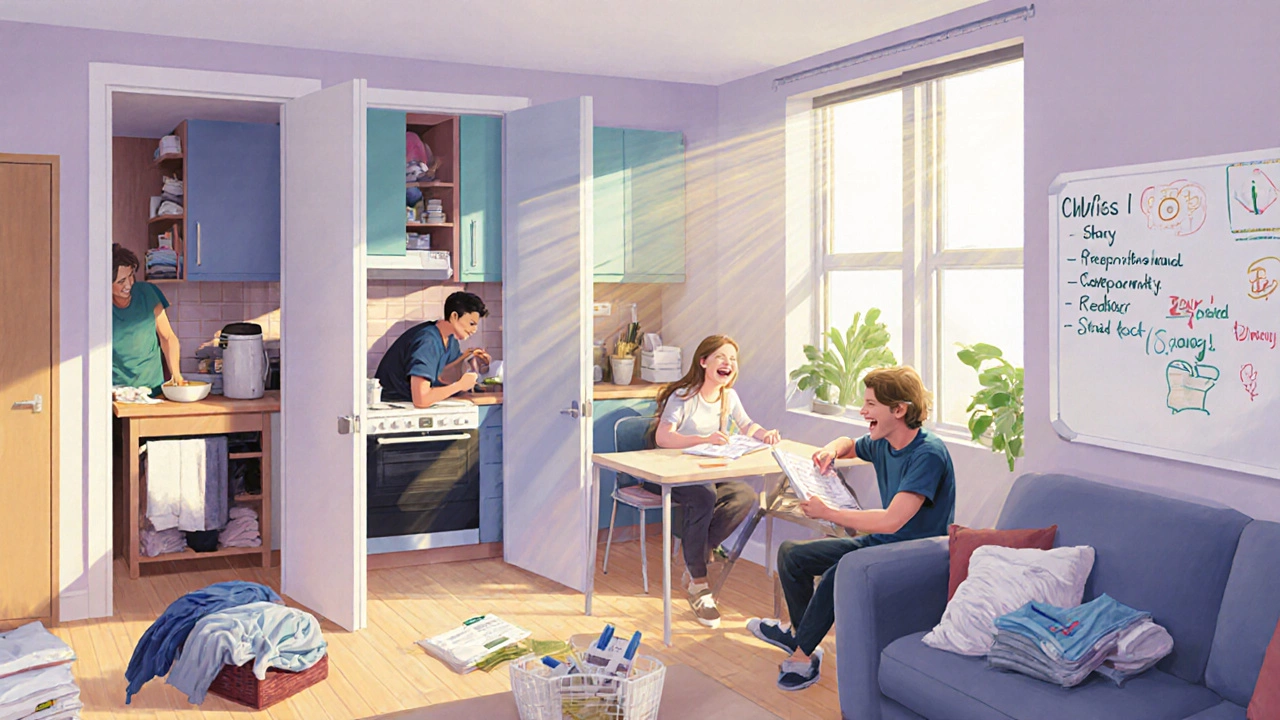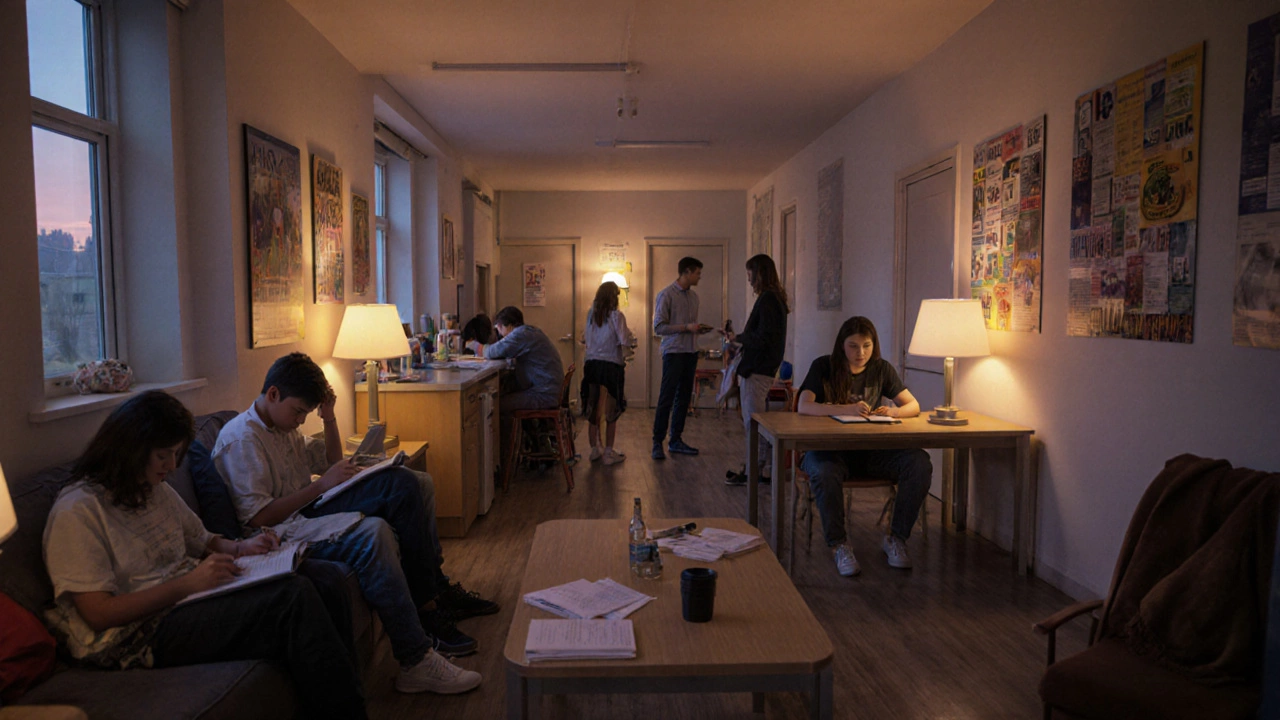When you’re heading off to university, where you live can make or break your first year. It’s not just about having a bed and a roof - it’s about safety, cost, quiet for studying, and whether you can actually stand your roommates. In New Zealand, especially in cities like Auckland, Wellington, and Christchurch, there are four main types of student accommodations that most students end up choosing. Each one has its own pros, cons, and vibe. Knowing the difference helps you pick the one that fits your life, not just your budget.
Dorms (On-Campus Housing)
Dorms are the classic student housing option. You rent a single or shared room in a building owned by the university. Bathrooms are usually shared with a floor or wing, and kitchens are communal. Most dorms come with basic furniture - bed, desk, chair, wardrobe - and include utilities like Wi-Fi, electricity, and sometimes even meals.
At the University of Auckland, dorms like the Grafton Residence or the City Campus Halls house over 1,500 students. They’re often the cheapest option for first-years, with prices ranging from $280 to $450 per week. The biggest perk? You’re steps away from lectures, libraries, and campus events. If you’re shy or new to the city, dorms help you make friends fast. But if you hate shared bathrooms or need quiet to study, this might not be for you. Noise levels can be high, rules are strict (no parties after 11 p.m., no guests overnight without permission), and you usually can’t choose your roommate.
Shared Flats (Off-Campus Rentals)
This is where most second- and third-year students end up. You rent a room in a house or apartment with 2 to 6 other students. Each person has their own bedroom, but you share the kitchen, living room, and bathroom. These flats are usually rented privately through agencies like Flatmates.co.nz or Facebook groups like "Auckland Student Flats".
Prices vary by location. A room in a flat near the University of Auckland’s City Campus might cost $300-$400 a week. In suburbs like Mt Eden or Newmarket, it could be $250-$350. You pay your own bills - electricity, internet, and sometimes cleaning supplies. The trade-off? More freedom. You can cook what you want, stay up late, and pick your housemates. But finding a good group matters. A messy roommate or someone who never cleans the kitchen can ruin your semester. Most leases are 12 months, so you’re locked in unless you find someone to take over your spot.
Homestays
If you’re an international student or just want a quieter, more structured environment, homestays are a solid pick. You live with a local family in their home. You get your own room and usually get breakfast and dinner included. Some families even help you with laundry or give you tips on local culture.
Homestays cost $350-$500 per week, depending on the location and meals included. They’re popular with students from Asia, the Middle East, and Latin America. The benefit? You get a built-in support system. Families often help with paperwork, teach you Kiwi slang, and even invite you to weekend barbecues. But you give up privacy. There are rules - no loud music after 10 p.m., curfews, no overnight guests without permission. If you’re used to independence, this can feel restrictive. But if you’re lonely or struggling with English, it’s one of the best ways to feel at home.

Private Studios (Self-Contained Units)
These are the most expensive but most private option. A private studio is a small apartment with its own kitchen, bathroom, and living space - all for you alone. You’ll find them in buildings like The Cube in Auckland or Student Village in Wellington. They’re designed for students who want total control over their space.
Prices start at $450 per week and can go up to $700 in central locations. You pay your own bills, but you don’t have to share anything. No noisy housemates. No cleaning disputes. Just you, your books, and your Spotify playlist. These are ideal for postgrads, mature students, or anyone with anxiety about shared living. But they’re rare. Most studios are booked months in advance, and you need a guarantor or proof of income to rent one. If you’re on a tight budget or just starting out, this might not be realistic - but if you can swing it, it’s the closest thing to living like an adult.
Which One Fits You?
There’s no single "best" option. It depends on what you need right now.
- Choose dorms if you’re new to university, want to meet people fast, and don’t mind sharing space.
- Choose shared flats if you’re independent, want to save money, and can handle the chaos of group living.
- Choose homestays if you’re international, need emotional support, or want to improve your English.
- Choose private studios if you value quiet, privacy, and control - and can afford it.
Most students start in dorms, move to shared flats by year two, and some end up in studios by their final year. It’s a progression - not a one-time decision. Your needs change as you grow into university life.

What to Watch Out For
Before you sign anything, check these things:
- Is the rent including bills? If not, add $50-$80 per week for electricity, internet, and water.
- Is the place near public transport? A 20-minute bus ride each way adds up in time and money.
- What’s the lease length? Most are 12 months. Can you break it if you leave early?
- Have you seen the actual room? Photos can be misleading. Always ask for a video tour if you can’t visit in person.
- Are the housemates vetted? Some flats have no rules - you could end up with someone who parties every night or doesn’t pay rent.
Don’t rush. A bad accommodation decision can mess up your grades, your sleep, and your mental health. Take your time. Talk to older students. Use your university’s housing office - they often have lists of verified rentals and can help you avoid scams.
Final Thought
Student housing isn’t just about where you sleep. It’s about where you learn to live on your own. Whether you’re in a dorm with 200 other first-years, a shared flat with three roommates who never wash the dishes, a quiet homestay with a family who calls you "kiddo," or your own little studio with a view of the harbor - each one teaches you something. Pick the one that gives you space to grow, not just a place to crash.
Are dorms cheaper than renting a flat?
Yes, dorms are usually cheaper. On-campus dorms at universities like Auckland or Otago cost between $280 and $450 per week, often including bills and meals. Off-campus shared flats range from $250 to $400 per week, but you pay extra for electricity, internet, and cleaning supplies - which can add $50-$80 per week. So while the base rent might be lower in a flat, the total cost can be similar or even higher.
Can I live in a homestay if I’m a local student?
Yes, but it’s less common. Homestays are mostly marketed to international students, but some families do accept local students - especially those from rural areas, students with special needs, or those who want a quieter environment. Check with your university’s accommodation office; they sometimes have listings for local students in homestays.
Do I need a guarantor to rent a studio?
Almost always. Private studios are treated like regular rentals. Landlords want proof you can pay rent - usually a guarantor (like a parent) who agrees to cover rent if you can’t. Some providers accept student loans as income, but you’ll still need to show bank statements or scholarship letters.
How early should I book student housing?
Start looking in July or August for a February start. Top dorms and studios fill up fast - some get booked by May. Shared flats are more flexible, but the best ones go quickly too. If you wait until January, you’ll be left with the last options - often far from campus or in poor condition.
Is it safe to rent from a private landlord on Facebook?
Be very careful. Many scams target students. Never send money before seeing the place in person or via live video. Never pay a deposit without a signed lease. Use official platforms like Flatmates.co.nz or your university’s housing portal. If the rent is way below market rate, it’s probably a scam.


Corbin Fairweather
I am an expert in real estate focusing on property sales and rentals. I enjoy writing about the latest trends in the real estate market and sharing insights on how to make successful property investments. My passion lies in helping clients find their dream homes and navigating the complexities of real estate transactions. In my free time, I enjoy hiking and capturing the beauty of landscapes through photography.
view all postsWrite a comment